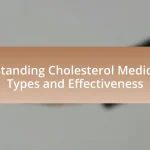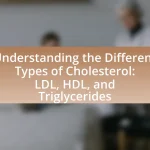Natural supplements for cholesterol, including plant sterols, omega-3 fatty acids, soluble fiber, and red yeast rice, have gained attention for their potential to manage cholesterol levels. These supplements can lower LDL cholesterol and improve overall heart health, with varying effectiveness based on specific ingredients and dosages. Scientific studies support their efficacy, indicating that plant sterols can reduce LDL cholesterol by 5-15%, while omega-3 fatty acids primarily lower triglycerides. However, consumers should consider potential interactions with medications and the importance of lifestyle changes, such as diet and exercise, to enhance the effectiveness of these supplements.

What are Natural Supplements for Cholesterol?
Natural supplements for cholesterol include plant sterols, omega-3 fatty acids, soluble fiber, and red yeast rice. Plant sterols, found in fortified foods and supplements, can lower LDL cholesterol levels by blocking its absorption in the intestines. Omega-3 fatty acids, commonly sourced from fish oil, have been shown to reduce triglycerides and improve overall heart health. Soluble fiber, present in oats, barley, and legumes, helps lower cholesterol by binding to it in the digestive system. Red yeast rice contains monacolin K, which is similar to the active ingredient in statin medications and can effectively lower cholesterol levels. Studies have demonstrated the efficacy of these supplements, with plant sterols reducing LDL cholesterol by 5-15% and omega-3 fatty acids contributing to cardiovascular health improvements.
How do natural supplements impact cholesterol levels?
Natural supplements can significantly impact cholesterol levels by lowering LDL (bad cholesterol) and raising HDL (good cholesterol). For instance, omega-3 fatty acids found in fish oil have been shown to reduce triglyceride levels and improve overall lipid profiles. A study published in the Journal of the American College of Cardiology found that daily intake of omega-3 supplements led to a 20-50% reduction in triglycerides. Similarly, soluble fiber from sources like psyllium and oats can lower LDL cholesterol by binding to bile acids in the intestine, promoting their excretion. Research in the American Journal of Clinical Nutrition indicated that a daily intake of 10-25 grams of soluble fiber can reduce LDL cholesterol by 5-10%. These findings demonstrate that specific natural supplements can effectively influence cholesterol levels in a beneficial manner.
What specific ingredients are commonly found in these supplements?
Common ingredients found in natural supplements for cholesterol include plant sterols, omega-3 fatty acids, soluble fiber, red yeast rice, and garlic extract. Plant sterols, such as sitosterol, are known to block cholesterol absorption in the intestines, while omega-3 fatty acids, primarily from fish oil, can lower triglyceride levels. Soluble fiber, found in oats and psyllium, helps reduce cholesterol levels by binding to bile acids. Red yeast rice contains monacolin K, which is similar to the active ingredient in statin medications, and garlic extract has been shown to have a modest effect on lowering cholesterol levels. These ingredients are supported by various studies indicating their efficacy in managing cholesterol levels.
How do these ingredients work to lower cholesterol?
Certain natural ingredients lower cholesterol by inhibiting its absorption in the intestines, promoting its excretion, or improving lipid metabolism. For example, soluble fiber, found in oats and barley, binds to cholesterol in the digestive system, preventing its absorption into the bloodstream. Additionally, plant sterols and stanols, which are structurally similar to cholesterol, compete with cholesterol for absorption, effectively reducing overall cholesterol levels. Research indicates that consuming 2 grams of plant sterols daily can lower LDL cholesterol by about 10%. Omega-3 fatty acids, present in fish oil, also contribute by reducing triglyceride levels and improving overall heart health.
What types of natural supplements are available for cholesterol management?
Natural supplements available for cholesterol management include plant sterols, omega-3 fatty acids, soluble fiber, red yeast rice, and garlic. Plant sterols can reduce LDL cholesterol levels by blocking its absorption in the intestines, with studies showing a reduction of up to 10% in LDL cholesterol when consumed in adequate amounts. Omega-3 fatty acids, found in fish oil, have been shown to lower triglycerides and may improve overall heart health. Soluble fiber, present in oats and legumes, can help lower cholesterol by binding to it in the digestive system. Red yeast rice contains monacolin K, which has a similar effect to statin medications in lowering cholesterol levels. Garlic has been associated with modest reductions in cholesterol levels, with some studies indicating a decrease of about 5-10% in total cholesterol.
What are the most popular natural supplements for cholesterol?
The most popular natural supplements for cholesterol include omega-3 fatty acids, plant sterols, soluble fiber, and red yeast rice. Omega-3 fatty acids, found in fish oil, have been shown to lower triglyceride levels and improve overall heart health. Plant sterols, which are found in certain fortified foods and supplements, can help reduce LDL cholesterol levels by blocking its absorption in the intestines. Soluble fiber, present in oats and legumes, can also lower cholesterol by binding to it in the digestive system. Red yeast rice contains monacolin K, which is similar to the active ingredient in some cholesterol-lowering medications, and has been shown to effectively reduce cholesterol levels.
How do different supplements compare in effectiveness?
Different supplements for cholesterol management vary significantly in effectiveness. For instance, plant sterols and stanols have been shown to lower LDL cholesterol by 5-15% when consumed in adequate amounts, as supported by a meta-analysis published in the American Journal of Clinical Nutrition. In contrast, omega-3 fatty acids primarily reduce triglycerides but have a minimal effect on LDL cholesterol levels. Additionally, soluble fiber, such as psyllium, can reduce LDL cholesterol by about 5-10% when taken daily, according to research in the Journal of Nutrition. Therefore, while some supplements are effective in lowering cholesterol, their impact can differ based on the specific type and dosage used.
What scientific evidence supports the use of natural supplements for cholesterol?
Scientific evidence supports the use of natural supplements for cholesterol, particularly through studies demonstrating the efficacy of specific compounds. For instance, a meta-analysis published in the American Journal of Clinical Nutrition found that plant sterols can reduce LDL cholesterol levels by an average of 10% when consumed in adequate amounts. Additionally, a study in the Journal of Nutrition indicated that omega-3 fatty acids from fish oil can lower triglyceride levels and improve overall lipid profiles. Furthermore, research published in the Journal of Clinical Lipidology showed that soluble fiber, such as that found in psyllium husk, can significantly lower total cholesterol and LDL cholesterol levels. These findings collectively affirm the potential benefits of natural supplements in managing cholesterol levels.
What studies have been conducted on the effectiveness of these supplements?
Numerous studies have been conducted on the effectiveness of natural supplements for cholesterol management. For instance, a meta-analysis published in the American Journal of Clinical Nutrition in 2015 reviewed 67 randomized controlled trials and found that plant sterols and stanols can reduce LDL cholesterol levels by an average of 10%. Another significant study published in the Journal of the American College of Cardiology in 2018 demonstrated that omega-3 fatty acids can lower triglyceride levels by 20-30% in patients with high triglycerides. Additionally, a systematic review in the Journal of Dietary Supplements in 2020 highlighted the cholesterol-lowering effects of red yeast rice, showing reductions in total cholesterol and LDL cholesterol levels. These studies collectively support the effectiveness of specific natural supplements in managing cholesterol levels.
What are the limitations of current research on natural cholesterol supplements?
Current research on natural cholesterol supplements is limited by a lack of large-scale, long-term clinical trials that adequately assess their efficacy and safety. Most studies are small, short-term, and often lack rigorous control groups, which undermines the reliability of their findings. For instance, a review published in the Journal of Clinical Lipidology highlighted that many studies on supplements like red yeast rice and plant sterols have methodological flaws, including inconsistent dosages and varying participant demographics, which complicates the ability to generalize results. Additionally, the potential interactions of these supplements with prescription medications are not well understood, further complicating their use in clinical practice.
How can individuals incorporate natural supplements into their cholesterol management plan?
Individuals can incorporate natural supplements into their cholesterol management plan by selecting specific supplements known to lower cholesterol levels, such as omega-3 fatty acids, plant sterols, and soluble fiber. Omega-3 fatty acids, found in fish oil, have been shown to reduce triglyceride levels and improve overall heart health, as evidenced by a study published in the Journal of the American College of Cardiology, which indicated that omega-3 supplementation can lead to a significant reduction in triglycerides. Plant sterols, which are found in fortified foods and supplements, can lower LDL cholesterol by blocking its absorption in the intestines, with research from the American Heart Association demonstrating that consuming 2 grams of plant sterols daily can reduce LDL cholesterol by 5-15%. Soluble fiber, present in oats and legumes, can also help lower cholesterol levels by binding to cholesterol in the digestive system, as supported by findings from the National Institutes of Health, which suggest that increasing soluble fiber intake can lead to a decrease in total cholesterol levels.
What dosage is recommended for optimal results?
The recommended dosage for optimal results in natural supplements for cholesterol varies by supplement type. For example, for red yeast rice, a common supplement, a dosage of 1,200 to 2,400 mg per day is often suggested based on studies indicating its effectiveness in lowering LDL cholesterol levels. Similarly, for plant sterols, a daily intake of 2 grams has been shown to reduce cholesterol absorption, leading to lower cholesterol levels. These dosages are supported by clinical research, such as a study published in the American Journal of Clinical Nutrition, which found that plant sterols can lower LDL cholesterol by 5-15% when consumed at the recommended levels.
Are there any potential interactions with medications?
Yes, there are potential interactions between natural supplements for cholesterol and medications. For example, supplements like red yeast rice can interact with statins, increasing the risk of muscle damage. Additionally, omega-3 fatty acids may affect blood-thinning medications, leading to an increased risk of bleeding. These interactions highlight the importance of consulting healthcare providers before combining natural supplements with prescribed medications to avoid adverse effects.

What are the potential benefits of using natural supplements for cholesterol?
Natural supplements for cholesterol can help lower LDL cholesterol levels and improve overall heart health. For instance, plant sterols and stanols, found in supplements, can reduce LDL cholesterol by up to 10% when consumed regularly, as supported by research published in the American Journal of Clinical Nutrition. Additionally, omega-3 fatty acids, commonly derived from fish oil, have been shown to lower triglycerides and may raise HDL cholesterol, contributing to better cardiovascular health. These benefits highlight the potential of natural supplements as effective tools in managing cholesterol levels.
How do natural supplements compare to conventional cholesterol medications?
Natural supplements generally have a milder effect on cholesterol levels compared to conventional cholesterol medications, which are often more potent and clinically proven. For instance, statins, a common class of cholesterol medications, can reduce LDL cholesterol by 20% to 60%, while natural supplements like omega-3 fatty acids or plant sterols typically lower LDL cholesterol by about 5% to 15%. Clinical studies, such as those published in the Journal of the American College of Cardiology, demonstrate that statins significantly reduce cardiovascular events, whereas the evidence supporting the efficacy of natural supplements is less robust and often varies by individual response.
What are the advantages of choosing natural supplements over pharmaceuticals?
Choosing natural supplements over pharmaceuticals offers several advantages, including fewer side effects, holistic benefits, and enhanced nutrient absorption. Natural supplements typically have a lower risk of adverse reactions compared to pharmaceuticals, which can cause significant side effects; for instance, a study published in the Journal of the American Medical Association found that nearly 30% of patients experience side effects from prescription medications. Additionally, natural supplements often provide a broader range of health benefits, as they can contain multiple active compounds that work synergistically, unlike many pharmaceuticals that target a single symptom. Furthermore, natural supplements may improve nutrient absorption due to their bioavailability, which is often higher than that of synthetic drugs, leading to more effective utilization by the body.
What side effects are associated with natural supplements?
Natural supplements can cause various side effects, including gastrointestinal issues, allergic reactions, and interactions with medications. For instance, supplements like garlic may lead to stomach upset or heartburn, while St. John’s Wort can interact with antidepressants, reducing their effectiveness. A study published in the Journal of the American Medical Association found that nearly 20% of individuals using herbal supplements experienced adverse effects, highlighting the importance of consulting healthcare professionals before use.
What lifestyle changes can enhance the effectiveness of natural supplements?
Adopting a balanced diet, regular exercise, and adequate hydration can significantly enhance the effectiveness of natural supplements. A balanced diet rich in fruits, vegetables, whole grains, and healthy fats supports overall health and improves nutrient absorption, which is crucial for the efficacy of supplements. Regular physical activity, such as aerobic exercise, has been shown to improve cardiovascular health and can amplify the benefits of cholesterol-lowering supplements. Additionally, staying well-hydrated aids in the proper functioning of bodily systems, facilitating the absorption and utilization of nutrients from supplements. These lifestyle changes are supported by research indicating that diet and exercise play vital roles in managing cholesterol levels and overall health.
How does diet influence cholesterol levels alongside supplements?
Diet significantly influences cholesterol levels, and when combined with supplements, the effects can be amplified. A diet high in saturated fats and trans fats can raise low-density lipoprotein (LDL) cholesterol, while a diet rich in fruits, vegetables, whole grains, and healthy fats can lower LDL levels and increase high-density lipoprotein (HDL) cholesterol. For instance, the American Heart Association recommends consuming omega-3 fatty acids, found in fish and flaxseeds, which can help lower triglycerides and improve overall cholesterol profiles. Additionally, supplements such as plant sterols and soluble fiber can further reduce LDL cholesterol levels by blocking its absorption in the intestines. Studies have shown that combining dietary changes with supplements can lead to a more significant reduction in cholesterol levels than either approach alone, highlighting the synergistic effect of diet and supplementation on cardiovascular health.
What role does exercise play in managing cholesterol with supplements?
Exercise plays a crucial role in managing cholesterol levels, particularly when combined with supplements. Regular physical activity can help raise high-density lipoprotein (HDL) cholesterol, known as “good” cholesterol, while lowering low-density lipoprotein (LDL) cholesterol, or “bad” cholesterol. Studies indicate that engaging in moderate-intensity exercise for at least 150 minutes per week can lead to significant improvements in lipid profiles. For instance, a study published in the Journal of Clinical Lipidology found that individuals who exercised regularly experienced a 5-10% increase in HDL cholesterol levels. This synergistic effect enhances the overall efficacy of cholesterol-lowering supplements, making exercise an essential component of a comprehensive cholesterol management strategy.

What should consumers consider before using natural supplements for cholesterol?
Consumers should consider the efficacy, safety, and potential interactions of natural supplements for cholesterol before use. Research indicates that while some natural supplements, such as omega-3 fatty acids and plant sterols, may help lower cholesterol levels, their effectiveness can vary among individuals. Additionally, consumers must evaluate the safety profile of these supplements, as they can cause side effects or interact with prescription medications. For instance, red yeast rice contains a natural statin but may lead to muscle pain or liver issues. Therefore, consulting a healthcare professional is crucial to ensure that the chosen supplement aligns with individual health needs and does not pose risks.
How can individuals assess the quality of natural supplements?
Individuals can assess the quality of natural supplements by examining factors such as ingredient sourcing, third-party testing, and certifications. High-quality supplements typically use ingredients that are sourced from reputable suppliers and are transparent about their sourcing practices. Third-party testing by organizations like NSF International or USP ensures that the product contains what it claims and is free from harmful contaminants. Certifications, such as organic or non-GMO labels, further indicate quality and adherence to specific standards. Research shows that supplements with these attributes are more likely to be effective and safe for consumption.
What certifications or labels should consumers look for?
Consumers should look for certifications such as the United States Pharmacopeia (USP) Verified Mark, NSF International certification, and Non-GMO Project Verified label when selecting natural supplements for cholesterol. These certifications indicate that the products meet specific quality, safety, and efficacy standards. For instance, the USP Verified Mark ensures that the supplement contains the ingredients listed on the label, in the declared potency and amounts, and is free from harmful levels of contaminants. NSF International certification verifies that the product has been tested for quality and safety, while the Non-GMO Project Verified label confirms that the product is made without genetically modified organisms.
How can one identify reputable brands in the supplement market?
To identify reputable brands in the supplement market, consumers should look for brands that provide third-party testing and certification. Third-party testing ensures that the products meet quality and safety standards, as evidenced by organizations like NSF International and USP, which verify the contents and purity of supplements. Additionally, reputable brands often have transparent labeling, including clear ingredient lists and dosage information, and they typically provide access to clinical studies or research supporting their claims. Brands with positive customer reviews and a history of good manufacturing practices further indicate reliability in the supplement market.
What are the common misconceptions about natural supplements for cholesterol?
Common misconceptions about natural supplements for cholesterol include the belief that they can replace prescribed medications, that all natural supplements are safe and effective, and that they provide immediate results. Many individuals assume that natural supplements, such as fish oil or plant sterols, can serve as a complete substitute for statins or other cholesterol-lowering drugs, which is misleading; these supplements may support cholesterol management but should not replace medical advice or treatment. Additionally, the perception that all natural supplements are inherently safe overlooks the fact that some can interact with medications or cause side effects. Lastly, the expectation of quick results from these supplements is often unfounded, as cholesterol levels typically require consistent lifestyle changes and time to improve.
Why do some people believe natural supplements are a cure-all?
Some people believe natural supplements are a cure-all due to the perception that they are safer and more holistic than pharmaceutical drugs. This belief is often reinforced by anecdotal evidence and marketing claims that suggest natural products can treat a wide range of health issues without side effects. Additionally, studies indicate that many individuals trust natural remedies because they align with a growing trend towards alternative medicine, which emphasizes prevention and wellness. For instance, a survey by the National Center for Complementary and Integrative Health found that approximately 30% of adults in the U.S. use dietary supplements, reflecting a significant reliance on these products for health management.
What myths exist regarding the safety of natural supplements?
Myths regarding the safety of natural supplements include the belief that they are always safe because they are “natural.” This misconception overlooks the fact that natural does not equate to safe; for instance, certain herbs can interact negatively with prescription medications or cause adverse effects. Research published in the Journal of the American Medical Association indicates that nearly 20% of herbal supplements contain unlisted ingredients, which can pose significant health risks. Additionally, another myth is that natural supplements do not require regulation; however, the FDA does monitor these products, albeit with less stringent requirements than pharmaceuticals, leading to variability in quality and safety.
What practical tips can help individuals effectively use natural supplements for cholesterol?
To effectively use natural supplements for cholesterol, individuals should first consult with a healthcare professional to ensure safety and appropriateness. This step is crucial as certain supplements can interact with medications or may not be suitable for everyone. Additionally, individuals should consider incorporating well-researched supplements such as omega-3 fatty acids, soluble fiber, and plant sterols, which have been shown to lower LDL cholesterol levels. For instance, a study published in the Journal of the American College of Cardiology found that omega-3 fatty acids can reduce triglyceride levels significantly. Furthermore, maintaining a balanced diet rich in fruits, vegetables, and whole grains while using these supplements can enhance their effectiveness. Regular monitoring of cholesterol levels is also recommended to assess the impact of the supplements and make necessary adjustments.










